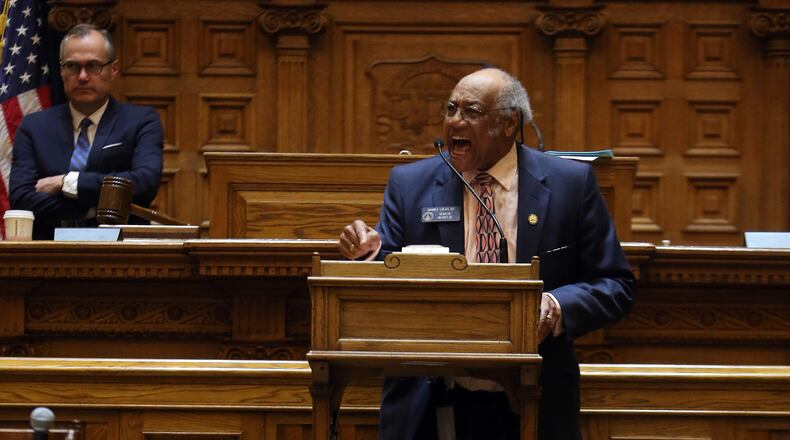Lawmakers approved Tuesday night two anti-Obamacare bills that all but guarantee Georgia won’t expand its Medicaid program and that will prevent state agencies from helping consumers sign up for new insurance coverage offered under the Affordable Care Act.
The Senate approved House Bill 990, by a vote of 35-19, which would strip the governor of the power to expand Medicaid or leave it unchanged, instead placing that decision in the hands of the General Assembly. The legislation now heads to the desk of Gov. Nathan Deal, a staunch opponent of the health care law, who has voiced support for the bill and is expected to sign it.
For now, the decision on Medicaid lies solely in the hands of the governor, which will change if he signs HB 990. Although Deal has steadfastly resisted expanding the program, saying the state cannot afford it, some had speculated that the governor might be willing to change his mind if he wins re-election in November. Once HB 990 takes effect, however, an expansion would require an act of the Legislature, the majority of which is even more opposed to Obamacare than Deal.
“This is something that we have talked about repeatedly and have decided against along with the governor,” said Sen. Renee Unterman, R-Buford, who carried the bill in the Senate.
Medicaid expansion would extend health coverage to an estimated 650,000 low-income Georgians, most of them adults without children. Deal has steadfastly rejected expansion, saying the state can’t afford to broaden a program that is already overwhelmed and critically flawed.
Expansion supporters, however, say the state shouldn’t turn its back on uninsured residents who desperately need access to health care.
“These are thousands of Georgians that we need to be concerned about,” said Sen. Steve Henson, D-Tucker, who opposed HB 990. “We have an obligation to Georgians to make sure that their health and safety are protected.”
The bill is one of two controversial pieces of legislation targeting the Affordable Care Act that have been hotly debated during the 2014 legislative session.
The second, House Bill 943, would bar any state or local governments, agencies or employees from advocating for Medicaid expansion, except under certain circumstances, or from creating a health insurance exchange. It also would bar the University of Georgia and any other state organizations from running health insurance navigator programs to help Georgia consumers buy insurance on the federally run Health Insurance Marketplace.
The bill would allow UGA to continue its navigator program until the $1.7 million federal grant it received to run it expires. But it was unclear late Tuesday night whether the university would be allowed under the law to use foundation or private money to continue its work.
Senate lawmakers gave final approval to HB 943 by a vote of 37-17 just before midnight Tuesday following some late-night political maneuvering by its supporters. The original bill proposed by Rep. Jason Spencer, R-Woodbine, House Bill 707, ran into a roadblock in a Senate committee earlier this week. But supporters managed to get much of its language inserted into HB 943, which deals primarily with oral cancer medications, at the last minute.
Statewide polls conducted for The Atlanta Journal-Constitution have consistently shown that about six in 10 Georgians support Medicaid expansion. The health care program currently covers 1.7 million mostly low-income children, pregnant women, the elderly and the disabled.
HB 990 was backed by top House leadership, including Speaker David Ralston, R-Blue Ridge, and Speaker Pro Tem Jan Jones, R-Milton, the bill’s sponsor. It passed the House with overwhelming support earlier this month.
While Unterman said that “we have debated this topic extensively,” Senate Democrats decried the fact that the bill flew through Senate committees with lightning speed and no chance for debate by lawmakers or the public.
“This is too important an issue to race through,” said Sen. Nan Orrock, D-Atlanta. “If you’re so convinced of your stand, can’t you survive the scrutiny of a debate about it? It makes one wonder.”
Obamacare supporters say the passage of HB 990 puts Medicaid expansion — already a long shot — that much further out of reach.
They say the state can’t afford to turn away the more than $30 billion in new federal funding Medicaid expansion would bring.
“Georgia is already home to more residents without health coverage than almost every other state,” said Tim Sweeney a health care policy expert with the left-leaning Georgia Budget and Policy Institute. “Failing to expand Medicaid ensures that our ranking in this area can only get worse.”
The governor’s estimates of how much the expansion would cost the state have ranged from an initial $4.5 billion over 10 years down to a more recent figure of $2.5 billion. Sweeney estimates, though, that the true cost would be closer to $350 million over a decade once new revenue is factored in.
Not all Republicans were in lockstep on the issue, either.
Sen. Chuck Hufstetler, R-Rome, said Tuesday that while he opposed the Affordable Care Act, he also is concerned that failing to expand Medicaid will hurt Georgia’s medical providers.
Health care providers already treat thousands of uninsured patients for free, and some rural hospitals are in danger of closing, Hufstetler said. And even though Medicaid doesn’t cover the full cost of care, many providers would rather have 60 cents on the dollar than zero cents on the dollar, he said.
“By not expanding, we’re telling them we’re not going to let you get federal money for patients you are forced to treat for free,” he said. “I’m very concerned this stance is going to force more hospitals to close.”
About the Author
Keep Reading
The Latest
Featured



